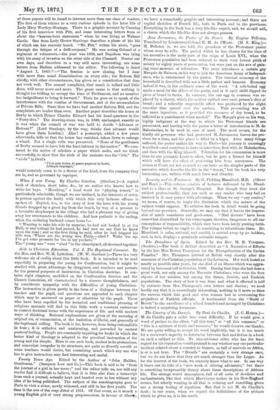Jean Jarousseau, the Pastor of the Desert. By Eugene Pelletan.
Translated by Lieutenant-Colonel E. H. de l'Hoste. (H. S. King.)— Id. Pelletan is, we are told, the grandson of the Protestant pastor whose story he tells. The period which he has chosen for the time of his narrative is the early part of the reign of Louis XVL, when the Protestant population had been reduced to their very lowest pitch of misery by eighty years of persecution, but were just on the eve of gain- ing some measure of toleration. The story introduces a certain gay Marquis de 3Iaisson, on his way to join the American Army of Independ- ence, who is entertained by the pastor. The internal economy of the household is described with not a little pathos and humour. Economy indeed it was, in the ordinary sense of the word. "A soft-boiled egg made a meal for the elders of the party, and in it each child dipped ita piece of bread in turns. In summer, the one egg in common was re- placed by a cherry, which the mother rubbed over each person's slice of bread ; and a tolerably respectable effect was produced by the slight rose-tint thus spread over the surface. This proceeding was all the more ingenious, as it provided the resource of dry bread, to be inflicted BB a punishment when needed." The Marquis goes on his way, highly indignant at the way in which his Protestant friends are persecuted, and leaving with the pastor a letter of introduction to M. de Malesherhes, to be used in case of need. The need occurs, for the kindly old governor who had protected M. Jaroussean leaves the pro- vince for a time, and his place is filled by a bigot. After many things suffered, the pastor makes his way to Paris—his journey is amusingly described—and contrives to have an interview, first with de 3Ialesherbes, and then with the King himself. Toleration for his communion is more than ho can persuade Louis to allow, but he gets a licence for himself which will have the effect of protecting him from annoyance. The scenes at Court are not so much to our taste as the simpler parts of the narrative which describe the life in the "desert," but the book is a very interesting one, written with much force and vivacity.


































 Previous page
Previous page